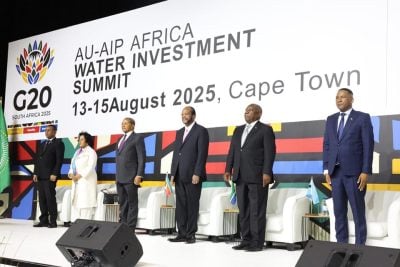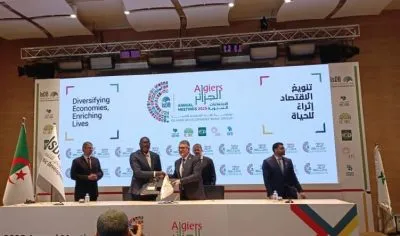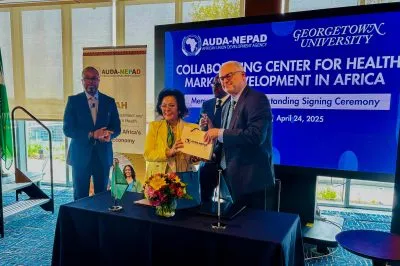Your strategy BADEA 2030 revolves around four pillars. Can you explain the significance of each of these pillars?
BADEA 2030 is our strategic framework that results from a wide consultation with different stakeholders associated with development issues in Africa, ranging from ministers of finance, economy, and development planning, DFIs, commercial banks, think tanks and academic world, United Nations, and African Union agencies to the civil society. Hence the resulting strategy accounts for both national development priorities and government commitments to the AU Agenda 2063 and the UN global Agenda. Indeed, it revolves around four pillars encapsulating key development priorities.
Infrastructure is the number one pillar: it includes social infrastructure (education and health), transport (road, rail, ports, airports), water supply facilities, energy (generation, transmission, and distribution), industry (focused on creating industrial parks), urban development; information and communication technology and the digital economy.
The second pillar is the private sector and trade financing, where areas of intervention include commodities and mining, manufacturing, industrial and construction equipment; financial and knowledge services; and tourism. With respect to trade, BADEA puts forward intra-Africa, and Arab-Africa trade financing windows.
The third pillar is the development of agricultural value chains with targeted areas such as land development, irrigation and water management, livestock and fisheries, agro-industry value chain (products and markets).
The fourth pillar is Small and Medium Enterprises, with a particular emphasis on women and youth entrepreneurship.
Capacity development comes in as a cross-cutting pillar to the four enumerated above.
In what ways do you expect the strategy to ensure the success of the AfCTA?
BADEA 2030 entails both enablers and boosters of intra-Africa trade though a number of instruments for the public and private sector. Reducing gaps in trade-enabling infrastructure, for instance, is a great contribution to the success of the AfCFTA. BADEA has a track record in financing infrastructure to promote regional integration and trade around the continent and we are committed to do more in the 2030 horizon. Most of the roads we have financed in landlocked countries have connected them to the road networks of those with access to seaports.
On trade financing, BADEA has a dedicated window for intra-Africa trade, where beneficiaries are empowered to trade more added value products in the spirit of the AfCFTA.
Can you report on any developments or success achieved so far with Afreximbank, with the Trade Development Bank or others?
To deliver upon its mission BADEA strongly believes in synergy from stakeholders and values partnership with other DFIs. To promote economic and social development in Africa BADEA has taken equity with both Afreximbank and TDB as well as with other regional development banks. Beyond equity participation, the Bank has worked productively with them on a number of initiatives to address development challenges.
BADEA has been working with Afreximbank on the Fund for Export Development in Africa (FEDA) to provide equity, quasi-equity, and debt capital to promote the intra-African trade, value-added export development, and manufacturing value chains.
BADEA, the AfDB and the OPEC Fund have partnered with TDB throughout risk sharing facilities and new funding of up to half a billion dollars. To mitigate the impact of the Covid-19, BADEA joined forces with Afreximbank and ITFC to launch a $1.5bn Collaborative Covid-19 Pandemic Response Facility. In the same line BADEA joined the Pandemic Trade Impact Mitigation Facility.
Can you detail any particular hopes or aspirations concerning November’s Arab-Africa summit in Riyadh and how, if achieved, they will help the goals of BADEA 2030?
As you know BADEA is an emanation of a political will and determination of the 18 founders from the League of Arab States. The Bank has been entrusted to promote economic and social development in Africa and promote cooperation between the Arab world and the Continent through investment and trade.
The African Union and the League of Arab States through a resolution of the 3rd Africa -Arab Summit on the mandated one hand BADEA to mobilise the Arab financial agencies, and on the other hand the African Development Bank (AfDB) along with other African and Arab sub-regional financial institutions to mobilise, coordinate and follow up on the financing and implementation of Joint Africa-Arab Projects under the Partnership Strategy between the two regions.
Having said, that it is expected the Arab-Africa Summit will boost the cooperation between the two regions and trigger more investment from both the public and private sectors and trade in areas of mutual interest including food security and energy transition.
Can you outline some of the greatest challenges concerning free trade in Africa and detail your expectations that these will be overcome to the great benefit of the continent?
To boost intra-Africa trade from its current level of about 14%, a number of challenges needs to be addressed. These are essentially non-tariffs barriers of which different regulations, rules of origin and quota.
Regulations dictate how a product can be manufactured, handled, and advertised. The wide difference in regulations among countries raises a pressing issue of harmonisation of standards to ease intra-Africa trade. As the AfCFTA is unfolding it is expected that such a harmonisation as well as the rules of origin will be addressed. The speed of movement of goods and people is also part of the regulation considerations, which entails agility in visa issuance or exemption as well as customs clearance.
Another hurdle to intra-Africa trade is the issue of payment. There cannot be trade without payment. And when it comes to trade with players from different countries using different currencies, some cannot afford to access market opportunities beyond their borders. Others, who can, endure hefty transaction costs. Hence, initiatives such PAPSS (Pan-African Payment and Settlement System) championed by the Afreximbank is expected to ease intra-Africa trade if joined at a large scale on the continent. BUNA is an equivalent vehicle for Arab Countries, launched by the Arab Monetary Fund. BADEA has been advocating for interoperability between the two systems to boost both intra-Africa and Africa-Arab trade.
Last but not least, infrastructure gaps are yet another challenge to be addressed and especially cross-country transport infrastructure like railways and roads.
Want to continue reading? Subscribe today.
You've read all your free articles for this month! Subscribe now to enjoy full access to our content.
Digital Monthly
£8.00 / month
Receive full unlimited access to our articles, opinions, podcasts and more.
Digital Yearly
£70.00 / year
Our best value offer - save £26 and gain access to all of our digital content for an entire year!

 Sign in with Google
Sign in with Google 



